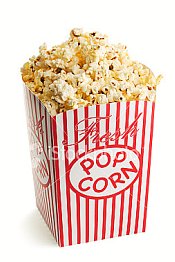|
"If You Have Diverticular Disease, Don't Pass On The Popcorn And Nuts!"
If the doctor says you have diverticular disease, you have diverticulosis. If it becomes inflammed you will have diverticulitis. Most people just use the term diverticulitis. They say it's a stomach inflammation.
Most diverticula occur in the sigmoid colon, the curved part of the large intestine closest to the rectum, and they tend to become more numerous as we age. Diverticula do not go away unless the section of colon is removed surgically. Diverticulosis simply refers to the presence of diverticula within the colon. You may not feel or show any symptoms of the disease. In the majority of cases, diverticulosis does not progress to diverticulitis. Diverticulitis is a complication of diverticulosis. Remember, itis at the end of a word refers to something that is inflamed or infected. Examples would be sinusitis, appendicitis, tonsillitis, etc. The doctor will do a blood test for Chronic Inflammation to help make a diagnosis. An attack of this disease can develop suddenly and without warning, and can be very dangerous if not treated promptly. Your Symptoms Might Include:
If you have any of these symptoms visit your doctor as soon as possible. They will do a blood test for inflammation and other tests could include x rays, a sigmoidoscopy or a colonoscopy to determine the cause. Diverticulitis is the beginning stage of peritonitis, caused when the inflammation begins to spread to the abdominal lining. Peritonitis is a serious condition that usually requires painful and expensive surgery. Microscopic or large holes in the intestinal wall occur in 15 - 20% of people who have diverticula. This is why, if you suffer from diverticulitis, treat your symptoms promptly, and prevent the onset or further spread of peritonitis. What Causes Diverticular Disease? The number one cause of diverticulitis is an increase of pressure in your colon. The current belief is that increased pressure is a direct result of low-fiber diets and constipation. Straining puts pressure on the colon and causes diverticula. A high-fiber diet along with plenty of water is helpful in preventing diverticular flare ups by moving food through the intestines quickly. It is currently the number one treatment recommended by doctors. It is believed you are most at risk for the disease if the following pertain to you:
Treatment for diverticulitis focuses on clearing up the inflammation and infection, and resting the colon. Depending on the severity of symptoms, the doctor may recommend:
If symptoms ease after a few days, the doctor will recommend gradually increasing the amount of high fiber foods, and anti inflammation foods
Severe cases of diverticulitis with acute pain and complications will usually require hospitalization. There they are treated with IV antibiotics and a few days without food or drink to help the colon rest. In some cases, surgery may be necessary. Acupuncture may help relieve pain and other symptoms. Acupuncturists treat people with diverticular disease based on an individualized assessment of the excesses and deficiencies of qi located in various meridians. Acupuncture and Chinese Medicine in general can be used effectively to promote gastrointestinal health. How Can You Help Prevent Diverticular Disease? A healthy life style and regular checkups are the best prevention. Do what is necessary to keep your colon healthy. Here Are Some Things You Can Do To Prevent Or Slow Diverticular Disease And Also Colon Cancer:
In the past, doctors often recommended avoiding nuts, popcorn and seeds, but studies are not showing this to be true, in fact some studies show the exact opposite. However there are people who do experience symptoms when they eat those foods. Know your own body. Everybody is different, so you might keep a food diary to identify what foods are causing your symptoms.
It may be wise to eat a diet rich in essential omega 3 fatty acids, and take a high quality pharmaceutical grade Omega 3 Fish Oil Supplement twice a day. Omega 3s help prevent chronic inflammation in your body and keeps you generally more healthy. Make it a habit to include pure manuka honey in your diet. Its an anti inflammatory as well as having anti bacterial properties. And it tastes good.
Eat grass fed beef rather than grain fed. Free range livestock that graze in pastures build up higher levels of omega 3s. Meat from grain fed animals has almost no omega 3s and too much saturated fat. You can find grass fed beef from your health food store or from a local farm that sells beef. This will help fight inflammation. It may also help prevent colon cancer. Ask your doctor about fish oil if you are on blood thinning medication. Probiotics, may also help maintain the health of the intestines. Some High Fiber Foods You Should Be Eating Regularly Include:
Stay Away From:
They Are Too High In Omega 6 Fats Which Cause Inflammation Reduce Your Intake Of All White Foods Such As:
For Maximum Health, Stick With The Anti Inflammation Foods. The National Institute of Diabetes and Digestive and Kidney Diseases and the National Cancer Institute sponsor research programs to investigate diverticulosis and diverticulitis. Research is ongoing in several areas, including:
The good news is up to 85% of patients recover with bed rest, liquid diet and antibiotics, and most never have a second episode of diverticulitis. Ulcerative Colitis
|





